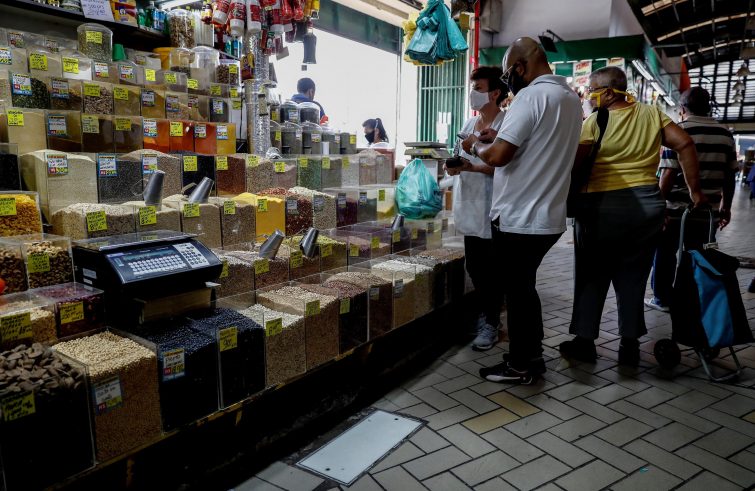
Over eight million infected with more than 300,000 dead. In many countries, the first lockdown began in March, but in some cases it did not succeed in preventing the pandemic from spreading (this applies, for example, to Peru). An alarming rise in poverty and unemployment, a tragedy within a tragedy for hundreds of thousands of migrants, mostly Venezuelans and Central Americans, left unaided and unprotected for months. Social tensions, erupted towards the end of 2019 in many countries and quelled by Covid-19, have resumed stronger than before, notably in Chile and Colombia, following the lifting of restrictions. What the President of the Latin American Episcopal Council, Monsignor Miguel Cabrejos, had defined as the “perfect storm” in an interview with SIR three months ago, is unfolding fully in the great region of Latin America and the Caribbean.
Yet charity, humaneness and hope are flourishing amidst this perfect storm, in the many gestures of solidarity fostered by Church bodies.
These include those of religious orders and congregations, located throughout Latin America. It is an important sign that entails closeness, as well as an understanding of the events, condemnation and prophecy, expressed to SIR by Gloria Liliana Franco Echeverri, a Colombian nun belonging to the order of the Society of Mary, President of the Confederation of Religious of Latin America and the Caribbean (CLAR), which brings together 22 National Conferences of Superiors – male and female – of Latin America and the Caribbean. A special and unique observatory to “interpret” the current situation in the Continent.
 Multifaceted presence. “Over the past few months, presence and proximity were the priority of Latin America’s men and women religious – she said -.
Multifaceted presence. “Over the past few months, presence and proximity were the priority of Latin America’s men and women religious – she said -.
Thanks to the numerous charisms, religious life embraces various spheres of life and each one of us are actively engaged primarily in his or her own specific area, starting with health care, what can be defined as the front line.
Furthermore, efforts focus on support to poverty against the backdrop of growing inequalities, education and training activity, migrant crisis – a veritable emergency. Many congregations have offered sanctuary to migrants and homeless people in their community homes and schools. Some of the orders and congregations have also created listening and counselling centres.”
Then, there is the great chapter of Amazonia: “Itinerant religious communities have been set up to provide relief in areas that lack both doctors and equipment – such as respirators. Volunteers are present in areas hit by the pandemic, and numerous initiatives aimed at collecting financial resources are underway for the purchase of medical equipment and medication.
Physical presence is of fundamental importance, especially in the Amazon region.
Not surprisingly, many men and women religious have been infected, especially in the Amazon rainforest area. It’s hard to obtain exact figures at the moment, but we are working on an in-depth mapping.”
Why the lockdown was ineffective. Religious communities’ commitment, according to Sister Liliana Franco, reaches out to other contexts: “Formative and informative dimensions, for example, as well as denunciation. Human rights violations intensified during the months of pandemic with the strengthening of corruption patterns. In this situation, inequalities dramatically emerged, especially as regards access to education and healthcare.”
According to the CLAR President, major imbalances are basically the cause of the failure of the rigid containment that many countries have tried to implement:
“The condition of inequality affects entire social classes with limited access to resources, which is why the lockdown mechanism was not effective”.
In short, those people with no means to buy something to eat, cannot stay at home. “It’s almost as if many governments imposed a lockdown to allow their fragile healthcare systems to prepare for the emergency.”
The corruption scandal. Given this situation, it’s hard to estimate when and how the pandemic will end. Especially since dedicated efforts are constantly confronted with the burden of corruption: “Many of the funds allocated for the people, even in recent months, have been misappropriated by those in positions of responsibility, thereby widening the gap between the wealthiest and the poorest groups and causing increased unemployment. In many cases people are facing hunger, and many congregations are working to respond to the lack of food.”
Thus, the commitment of men and women religious involves denunciation and prophecy:
“We cannot remain silent before such violations, before the situation of migrants, human trafficking, violence against women, often inside the family. Furthermore, we are faced with the major challenge of integral ecology, the care of life and creation, at a time when the pandemic is being exploited to further deforestation, intensive farming and mining projects, which is what is happening in Brazil.”
No wonder that social unrest, which broke out in the last months of 2019, is resuming throughout the region. Even in this case, the religious are more than just spectators: “In fact, resistance movements continued being active throughout the past months, albeit in small groups, for example in Ecuador and Colombia.
Religious congregations and communities may differ in their approach, with passive and active congregations calling for new forms of participation and public policies.
Moreover, in the past months there have been numerous opportunities, albeit remotely, through webinars, to analyze the situation, to offer reflections and proposals, and to raise awareness.”
There is great anticipation for the new encyclical of Pope Francis that will be presented next October 3: “We are all looking forward to it” – said Sister Gloria Liliana Franco – “We believe that the new papal document will motivate us for a more fraternal world, for a more inclusive and creation-oriented economy, for a new post-Covid world.”
(*) “La vita del popolo” (Treviso)









